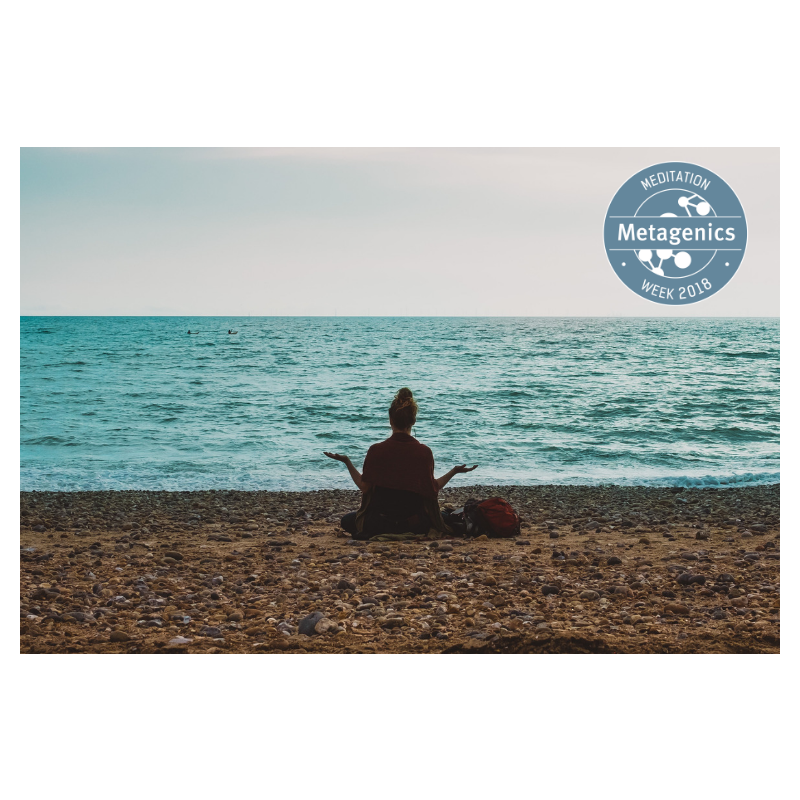|
If modern life’s got you feeling frantic, you’re not alone. These days, it seems most of us are living in an almost constant state of ‘on,’ pulled in too many directions at once, pressured from all sides, over-tethered to tech and perpetually behind the eight-ball. Amidst the daily chaos, it can be mind-bogglingly challenging to find the respite that your brain and body so desperately need.
While a vacation by the sea or to the mountains always helps, in between getaways, it’s essential to find other ways to unwind your hyped-up mind, relax your too tense body, and feel more peaceful. How to do that without booking a trip to paradise? In a word: meditation. Yes, I know, you say you’ll get around to it when you’re less stressed, when the kids graduate college, when the cows come home, yada, yada, yada. But now, actually, when you’re in the middle of the “Stress-nado,” is as good a time as any to start (or re-start) your meditation practice. Not only is meditation an always-accessible, drug-free stress-buster, you’ll also be gifting your heart, brain and gut with system-wide health benefits no prescription drug can touch. Here are a few ideas to inspire your meditation practice and how to get started: Make meditation your emotional medication. Meditation cultivates adaptability and resilience and reduces reactivity. A steady practice can help you manage strong emotions and ride the choppy waves of life, be they in the form of an angry teenager, a demanding boss, bumper-to-bumper traffic, or just about anything in between. A regular meditation practice helps create a solid, more chilled-out foundation from which you can never be fully rocked. When you start the day from a calmer place, you’ll be less likely to fly off the handle when life triggers you – and that’s good news for everyone in your life. Think of it this way: meditation is medication without a single downside. Meditation will help keep your brain healthier, longer. Meditation also delivers plenty of physiological benefit too. This practice has a remarkably positive influence on keeping chromosomes young; helping to improve focus, attention, memory, processing speed, and creativity; and it may even slow brain aging, counteracting the age-related atrophy that can lead to cognitive decline and conditions like dementia. So, no more excuses, eh? Meditation will take the edge off anxiety and high blood pressure. Meditating is also linked to decreased blood pressure and reduced stress and anxiety, which is why a daily practice “primes the pump” for getting a good night’s sleep. You’ll help trigger the release of feel-good endorphins that boost mood, help curb anxiety and tame pain. You’ll also reduce stroke and heart disease risk. Best of all, you don’t need to retreat to a hut in Nepal to reap the enormous benefits of the practice. Regular sitting for as little as ten minutes a day can have positive effects. With practice, as your sessions grow longer, to 20 or 30 minutes or more, all those physiological and psychological benefits will to! Get into the groove – with as much assistance as you need. As for learning how to meditate, there are many options available. There are numerous books by established teachers and plenty of YouTube demos – all of which are great for getting your toes wet. But frankly, nothing beats working directly with a live instructor, in real time. Building a relationship with a teacher will help you develop and maintain a lifelong practice, and help keep you engaged and accountable through the peaks and valleys. Remember, meditation is a practice – the more you meditate, the better you’ll get at it, so be patient with yourself and keep practicing. For extra support between sessions with your teacher, you can also incorporate an app into your practice. Among them: Calm; The Mindfulness App; OMG! I Can Meditate! and Stop, Breathe & Think and Smiling Mind to name a few. Give brain and body a vacation, any time you need to. When you think meditation, images of ancient holy men in the Lotus position may come to mind. That, understandably, may not exactly be your speed. Feel free to sit with feet folded over your thighs if you like, but you can just as easily settle into a comfortable chair or meditate while standing, walking or lying down. Just shut your eyes (or keep them open, if you prefer) and focus on your breathing for a few moments and that will do the trick. The goal is to to put the brakes on your over-revved system and literally just breathe. You have the time. Seriously. You do. I know you’re probably saying, “But doc, there aren’t enough hours in the day!’ and yes, that’s true to a point. But I’m not asking you to put in hours every day. If you do, bravo! For everyone else, it’s about being creative with your time, and committing to a program that fits into the small slivers of time you do have, right now. Down the road, as your practice grows, you can make more time for meditation if you choose. But to begin, feel free to start small with these tips: 1. At the start or end of your day, trade 10 minutes of time-sucking social media, video games or TV for 10 minutes of meditation. 2. Two to three mornings a week, get up a few minutes earlier to meditate upon rising, before the rest of the family wakes up. 3. Meditate in the car before or after the drive, instead of listening to the news or making calls. 4. On the commuter train, put on a pair of noise canceling headphones, and meditate instead of reading email or the headlines. 5. At lunchtime, pop into a local house of worship and enjoy the silence while you meditate. 6. ‘Book a cushion’ at a drop-in meditation studio like MNDFL, for a 30-minute group lunchtime session.
1 Comment
|
Categories
All
Archives
April 2024
|
|
Join Our Community
|
|
Amipro Disclaimer:
Certain persons, considered experts, may disagree with one or more of the foregoing statements, but the same are deemed, nevertheless, to be based on sound and reliable authority. No such statements shall be construed as a claim or representation as to Metagenics products, that they are offered for the diagnosis, cure, mitigation, treatment or prevention of any disease. |



 RSS Feed
RSS Feed